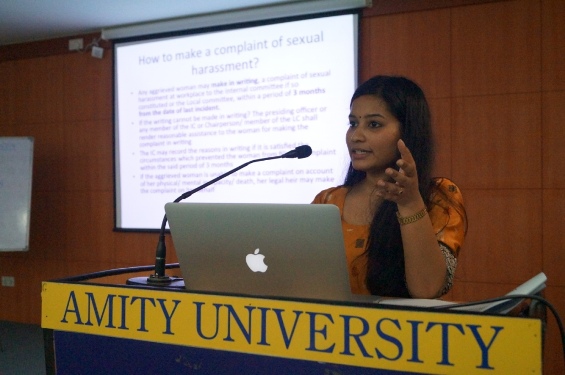13 Feb 2014|Noida | Amity University Campus, Sector-125 Noida
Interactive Session on “Sexual Harassment of Women at Workplace” held at Amity Institute of Competitive Intelligence and Strategic Management

Amity Institute of Competitive Intelligence and Strategic Management organized an Interactive Session on the topic “Sexual Harassment of Women at Workplace” by Ms Salina Wilson and Ms Niharika Mahajan, Researchers and Social Activists from Human Rights Law Network at Amity University Campus, Sector- 125, Noida.
The speakers were welcomed by Maj. Gen. (Retd.) Ashok Krishna- Advisor, Amity Institute of Competitive Intelligence and Strategic Management.
The speakers apprised the students with “Sexual Harassment of Women at Workplace (Prevention, Prohibition and Redressal) Act, 2013” and various clauses and sub- causes under the Act. Ms. Selina Wilson explained that Sexual harassment goes beyond physical contact and further, defined “Sexual Act” as unwelcome behavior or acts including Physical Contact or Advances; a Demand or request for sexual favors, making sexually colored remarks, showing pornography or any other unwelcome physical, verbal or non- verbal conduct of sexual nature. She stressed that the Act covers paid as well as non- paid workers working on permanent, temporary or adhoc- basis and also, women working in the unorganized sector, such as domestic workers and day laborers.
Ms Niharika Mahajan, referring to the Act, outlined that every employer of a workplace with more than 10 employees, has to constitute an Internal Complaints Committee (ICC) which would consist of a Presiding Officer who shall be a woman employed at senior level in the organization, atleast two members from the organization who are committed to the cause of women and one member from outside preferably from an NGO.
The speakers also briefed the students about Constitution and role of Local Complaints Committee (LCC), role of District Officers in LCC, Procedure of making complaint of sexual harassment by aggrieved woman within a period of ninety days from the date of incident, inquiry report by LCC/ICC and various other provisions.
Talking about the responsibility of an employer with reference to the Act, Ms. Mahajan said that the duty of an employer does not finish with the constitution of ICC; he needs to provide a safe working environment, display at various conspicuous places in the workplace, the penal consequences of sexual harassment and organize workshops and awareness programmes in this regard.
Talking about the loopholes in the Act, the speakers conceded that the Act is not gender neutral and does not cover prostitutes offering their services in brothel. Ms. Wilson rued that if harassment is proved, the law leaves it up to the internal committee to decide a monetary fine to be paid by the perpetrator, depending on his “income and financial status” irrespective of the nature and kind of sexual assault. Moreover, if the aggrieved woman wants to approach the Court, she can do so only after taking authorization of LCC or ICC and if these bodies are complicit to the aggressor, the problem aggravates. The successful execution of the Act depends upon the goodwill of employer, District Officer, ICC or LCC, making it all the more vulnerable.
The inquisitive students posed a volley of questions to the erudite speakers who lucidly explained them the various provisions of the Act